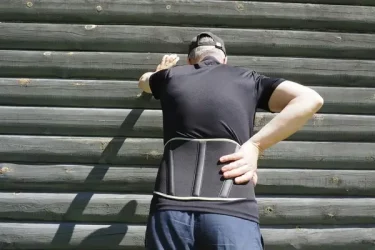Estimated reading time: 4 minutes
Hernias are a common condition that affect many people in the UK. In fact, every year, around 100,000 people undergo hernia treatment every year. While many cases aren’t serious, they can cause a lot of pain and discomfort. In some cases, hernias require surgical intervention. If you suspect you’re suffering from the symptoms, it’s important to know when to worry about hernia pain and when to seek medical attention.

Private hernia repair surgery at a glance
- Waiting time: 4-6 weeks
- Cost: £3,299
- Ways to pay: self-pay, insured, payment plans
On this page:
A hernia occurs when an organ or tissue pushes through a weak spot in surrounding muscles, commonly in the abdomen or groin. While many hernias are not immediately dangerous, severe pain, swelling, discoloration, or changes in bowel/bladder habits can signal a serious complication which requires urgent medical attention.
Wellsoon private healthcare
Wellsoon is a service from Practice Plus Group that provides a range of treatments for patients paying for themselves or paying by private medical insurance. With no hidden costs, you’ll pay less than you might think and be back to your best sooner than you thought.
- £95 consultation within 1 to 2 weeks* – includes x-ray, bloods and swabs
- Surgery in just 4 to 6 weeks*
- Experts in hips, knees, eyes, hernias and more
- Pay for yourself or via health insurance
- 0% finance options available

What is a hernia?
Firstly, it’s important to understand what a hernia is. A hernia occurs when an internal organ or tissue protrudes through a weak spot in the surrounding muscle or tissue. They can occur in different parts of the body, but are most commonly found in the tummy or groin area.
Types of hernias
There are several different types of hernias that can develop:
- Inguinal hernias – this is the most common type of hernia. Inguinal hernias occur when the fatty tissue or part of your intestine or bowel pokes through into your groin area (inguinal canal). It mainly affects men and is associated with ageing
- Femoral hernias – similar to inguinal hernias but less common. These affect more women than men
- Umbilical hernias – this is most common in babies and occurs when weak spots appear in the abdominal wall, causing a lump to develop near the belly button
- Hiatus hernias – this happens when part of the stomach squeezes up into the chest through a weak spot in the diaphragm. This sort of hernia may cause heartburn in some people and is usually treated with medication. Please note, we do not offer surgery for hiatus hernias at Practice Plus Group
- Incisional hernias – this is when tissue pokes through a surgical wound in your stomach that has not fully healed or closed properly.
Common hernia symptoms
The most common symptom of a hernia is a bulge or lump that appears when you strain or lift something heavy. This bulge may disappear when you lie down. Other possible symptoms of a hernia include:
- pain or discomfort in the affected area (especially when you cough, lift heavy objects, or strain during a bowel movement)
- a dragging sensation
- a feeling of being full.
Is a hernia dangerous?
If left untreated, some hernias can become strangulated. This means the blood supply to the trapped tissue is cut off. This can be life-threatening and there is a very small risk of your abdominal hernia bursting.
Is a hernia painful?
In some cases, hernias may not cause any pain or discomfort at all. Some hernias may be asymptomatic and only discovered during a routine physical examination or imaging test.
However, others can cause significant pain. This is most likely during activities that involve strain like lifting, bending or coughing.
The amount of pain you experience with a hernia can also depend on its size and location. Smaller hernias may cause less discomfort than larger hernias, while hernias located in certain areas of the body may prove more uncomfortable than others.
It’s important to note that while hernias can be painful, they don’t all require immediate medical attention. It’s important to seek medical advice if:
- you experience severe or persistent pain
- the bulge or lump associated with your hernia becomes red or discoloured.
What does hernia pain feel like?
The severity and type of hernia pain varies from person-to-person. However, it’s most often described as a dull ache or pressure in the affected area. You may also feel a burning or stabbing sensation or experience shooting pain. The discomfort may worsen when you’re performing activities like lifting, bending or coughing, and may improve when you rest or lie down.
If you’re experiencing symptoms of hernia pain, it’s important to seek medical attention. Your doctor will be able to perform a physical examination and determine the best course of treatment. In some cases, surgery may be necessary to repair the hernia and alleviate your symptoms.
Can a hernia cause back pain?
While hernias typically occur in the tummy or groin, they can also cause referred pain in other areas of the body. This includes the back. The reason for this is that hernias can put pressure on nearby nerves and surrounding tissues, which can cause pain to radiate to other areas of the body.
If you have a hernia that’s causing referred pain in your back, you may be experiencing a dull ache or sensation of pressure. You may also experience a sharp, shooting pain or a burning sensation. The pain may worsen when you’re standing or performing physical activity, and may improve when you rest or lie down.
How do you know if hernia pain is serious?
You should go to A&E immediately if you develop any of the following symptoms:
- sudden severe pain
- vomiting
- persistent difficulty going to the toilet or passing gas
- the hernia becomes firm, tender, or cannot be pushed back in.
What does it mean when your hernia starts hurting?
If you experience any of the symptoms listed above, it could mean that blood supply to an organ has been obstructed. This is called strangulation which could be life threatening. You should seek medical attention immediately.
How long can you go with a painful hernia?
This depends on the type of hernia and how much pain you’re in. Some people are able to delay surgery for months or even years. Others may never need surgery, particularly if the hernia is small and the symptoms are minor.
How to relieve hernia pain at home
While surgery is often the best way to treat a hernia, there are some non-surgical steps you can take to help relieve pain.
Apply heat or cold
Applying heat or cold to the affected area can help reduce pain and discomfort. A warm compress helps to relax the muscles and reduce inflammation, while a cold compress can help numb the area and reduce swelling. Try applying a heating pad or ice pack to the affected area for 15-20 minutes at a time, several times a day.
Wear a supportive garment
A hernia belt or truss can help support the affected area while reducing pain and discomfort. These garments work by applying gentle pressure to the hernia, which can help keep it in place and prevent it from bulging out.
Avoid activities that aggravate the hernia
Certain activities such as lifting heavy objects or strenuous exercise can aggravate a hernia, causing pain and discomfort. Try to avoid these activities and limit your physical activity until you’re feeling better.
Eat a healthy diet and maintain a healthy weight
Eating a healthy diet and maintaining a healthy weight can help reduce pressure on the affected area and consequently help to manage hernia pain. Try to avoid foods that cause bloating, such as fried or fatty foods.
It’s important to note that these tips are not a substitute for medical treatment. If you’re experiencing severe or persistent hernia pain, you should speak to your doctor.
When to worry about hernia pain
If you experience any of the following symptoms, it’s important to seek medical attention:
- Severe pain: Experiencing severe pain in the affected area (especially if it’s accompanied by fever or nausea)
- Swelling or discoloration: If the bulge or lump of hernia becomes red or purple, or if you notice swelling or tenderness
- Inability to push the bulge back in: If you’re unable to push the bulge or lump back in, or if it becomes stuck, it could be a sign of a strangulated hernia
- Changes in bowel movements or urination: If you experience changes in your bowel movements or urination, such as constipation or difficulty passing urine, it could be a sign of a serious complication associated with your hernia.
If you’re experiencing any of these symptoms, your doctor may perform a physical exam and recommend further testing. This could involve ultrasounds or CT scans that can determine the best course of treatment for you.
In conclusion, while the majority of hernias aren’t serious, it’s important to know when to seek medical attention for hernia pain. Severe pain, swelling, discoloration, or changes in bowel movements or urination are all key symptoms to watch out for.
If you’re worried about a hernia and are seeking treatment, don’t hesitate to get in touch with our team or a hernia specialist near you for more information.





